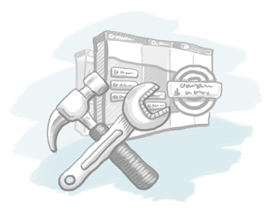 A sales process (or sales pipeline) is the journey sales teams take prospects on to encourage them to become a customer.
A sales process (or sales pipeline) is the journey sales teams take prospects on to encourage them to become a customer.
A typical sales pipeline has the following five b2b sales process stages:
- Prospecting stage: This stage uses lead generation strategies to find suitable prospects.
- Qualify: Once a lead has been found, it needs to be qualified (i.e. does a prospect have genuine potential to progress down the pipeline?)
- Proposal: Once a lead has been qualified, the next step is to outline a proposal and show a prospect, in detail, specifically how you can help.
- Decision: Next the prospect will decide whether or not to buy.
- Repeat business: Finally, lay the foundations for the customer to become a regular buyer and convince them they made a sound buying decision.
A well-defined B2B sales process is a valuable asset for your business
A robust sales process will help you maximise the performance of your sales team, encourage growth and attract more qualified leads. That’s because your sales process is uniquely positioned to outline and describe best practice tools and techniques to successfully guide a prospect through the journey to becoming a customer.
One of the key benefits of a sales process is it introduces structures and systems into your business. When managing a team of sales reps, a clearly defined sales pipeline can help you:
- Standardise the process
- Ensure all staff replicate best practice
- Ensure everyone has access to the tools and techniques known to deliver the best results and the highest conversion rates
Without a sales process, you risk your team operating inconsistently. In turn, this leads to confusion, inefficiency and bad practice. In addition, without a clearly defined process to follow, it’s possible inexperienced (or poor performing) sales reps could skip crucial stages of the pipeline leading to leaks and lost sales.
Benefits of a robust B2B sales process
Here are some further benefits of embedding a robust sales process into your organisation:
#1: You have a process to manage and analyse.
With a defined system in place, coupled with the expectation that everyone is following the same process, your pipeline instantly becomes easier to measure and monitor. People can be given specific targets, and key metrics can be identified and analysed.
#2: You can identify opportunities for improvement.
Your sales process shouldn’t be static. Instead it should be a flexible system that’s continuously being improved as a result of feedback and testing by your sales team on the ground. That way you can tweak and amend to:
- Shorten the length of the pipeline or accelerate the rate at which prospects move through the various stages. This increased efficiency will save money and time – leaving your staff free to actively pursue more leads and nurture more sales.
- You’ll also be able to identify any persistent leaks in your sales pipeline. For example, you may discover a number of highly qualified leads drop out at a certain point. If you know where this is and why it’s happening, you can implement a fix and therefore increase the overall performance of your pipeline.
#3: You can integrate new staff quickly.
Once your pipeline is clearly defined, the task of bringing on new sales reps will be far easier. Forget the ad hoc, disorganised learning process, instead they’ll have a clearly defined system to get them up to speed quickly. You can predict your revenue: If your sales process is repeatable, it follows that there must be an element of predictability at each stage. This predictability is invaluable as it can help you improve your forecasting accuracy and even predict your revenue based on the number of solid leads you generate.
As you can see, having a robust sales process in place that’s understood and embraced by your sales team is a proven way to increase the efficiently of your sales reps and ultimately close more leads.
But did you know you could make your b2b sales process work even harder by embedding it into the right CRM tool?
Let me explain…
Smart technology can help
Intuitive CRM software is a powerful tool that can help you monitor, review and enhance the performance of your sales pipeline. When you have the ability to visualise and follow your sales process in real time, you can identify problems. For example:
- You may spot bottlenecks or leaks
- You may notice that certain stages are taking too long to navigate OR
- You may spot the conversion rates at different stages are under par
When you can access information as detailed as this, you empower your sales team for success – and Pipeliner can help you do just that. To find out more, sign-up for a free CRM software trial.










